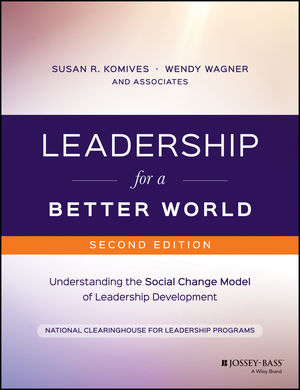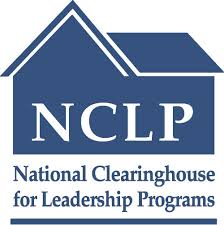SRLS Resources
- Overview of the Social Change Model
- Multi-Institutional Study of Leadership
- The National Clearinghouse for Leadership Programs
- Research Findings Database
- Theses & Dissertations
Use SRLS to supplement the Social Change Model textbook: "Leadership for a Better World"
Authored by nationally recognized leadership educators, this student textbook provides through, practical guidance in how to put the Social Change Model of Leadership Development to work. Written in an informed yet approachable tone, the book uses a case-study approach, highlighted by students' voices and experiences, to bring its key insights to vivid life.

Overview of the Social Change Model
The SCM was created in 1993 by the Higher Education Research Institute at UCLA in an effort to enhance student learning and facilitate positive social change. The model was founded on the idea that leadership is a process based on the following assumptions:
Leadership is:
- Socially responsible
- Collaborative
- Processional, not positional
- Inclusive and accessible to all
- Values-based
- Oriented around facilitating change
- Group
- Individual
- Community/Society
- Collaboration - Working with others in a common effort. Collaboration constitutes the cornerstone value of the group leadership effort because it empowers self and others through trust.
- Common Purpose - Working with shared aims and values. Common purpose facilitates the group’s ability to engage in collective analysis of the issues at hand and the task to be undertaken.
- Controversy with Civility - Recognizes two fundamental realities of any creative group effort—differences in viewpoint are inevitable and these differences must be aired openly, but with respect.
- Consciousness of Self - Awareness of the beliefs, values, attitudes, and emotions that motivate one to take action.
- Congruence - Thinking, feeling, and behaving with consistency, genuineness, authenticity, and honesty.
- Commitment - Motivational energy to serve and drive the collective effort. Commitment implies passion, intensity, and duration.
- Citizenship - Process whereby the individual and the collaborative group become responsibly connected to the community and the society through the leadership development activity.
The Multi-institutional Study of Leadership (MSL)

The Multi–Institutional Study of Leadership (MSL) was initially conceived as a means to enhance institutional practice by better aligning the theory–research–practice cycle. A team of colleagues at the University of Maryland recognized the significant gaps between theory and research as well as research and practice in the current paradigm of college student leadership development. Their observations sparked dialogue around the limitations imposed by the lack of national data against which student development and institutional effectiveness could be bench-marked—and against the material consequences of this on intentional practice in leadership education. MSL emerged as a means to specifically address questions regarding students’ educational needs and to identify elements of the higher education environment that contributed most significantly to leadership outcomes.
The mission of the MSL is to provide educators with the tools necessary to make smart investments that reap large returns when it comes to developing leadership capacity in students. The MSL offers a rich set of benefits to help you engage in evidence-based practice. The MSL includes the SRLS and other scales related to leadership self-efficacy, well-being, and critical hope. Schools have used MSL results to:
- Design new programs and services ranging from leadership minors and certification programs to reorganizing departments to better meet learning needs
- Justify and increase human and financial resources including new professional staff positions and additional funding
- Provide evidence of student learning for accreditation and institutional assessment purposes
- Educate the campus community on unique learning needs and how to positively influence student development
The National Clearinghouse for Leadership Programs (NCLP)

The SRLS and SRLS online are owned and
managed by the
National Clearinghouse for Leadership Programs (NCLP).
NCLP, through the development of cutting edge
resources, information sharing, and symposia,
supports leadership development in college
students by serving as a central source of
professional development for leadership educators.
The NCLP also works to connect leadership educators
to one another and support those developing
leadership programs in their communities.
Guiding Principles
- leadership is a relational process of people working together to accomplish change or to make a difference that will benefit the common good.
- everyone is involved in the leadership process and that everyone is capable of being an effective leader.
- leadership qualities and skills can be learned and developed and leadership can be exhibited in many ways.
- leadership is a values-rich process that can be practiced in multiple contexts because leadership is contextual.
- leadership education, training, and development should focus on expanding a student's inner knowledge of oneself and one's relations with others, enabling them to engage in the leadership process in various contexts.
- institutions should be committed to enhancing and developing the leadership capacities of students so they may enhance their professions, their communities, and society.
- leadership initiatives and programs should embrace the values of diversity and inclusion in processes and content, to empower students to be effective change agents in a pluralistic world.
- leadership educators should contribute to the scholarship of leadership, help to advance the field of leadership studies, enhance effective pedagogies to develop leadership, and improve standards of practice.
Research Findings Database on the Social Change Model of Leadership Development
Social Change Model Database
Compiled by Ana Maia
January, 2016
Since 1996, the Social Change Model (SCM) has been widely used in higher education as a model of socially responsible leadership particularly focused on social change. Quantitative studies have largely used the Socially Responsible Leadership Survey (SRLS) with a large body of work from the Multi-institutional Study of Leadership (MSL). Qualitative studies also examine the development of the SCM within distinct groups of students. This searchable database is aimed at helping researchers and program developers intentionally examine existing findings for research and practice. If you know of other studies not included in this grid, please contact me at komives@umd.edu.
Select Theses & Dissertations
Anderson, M. (2012). The leader development of college students who participate in different levels of sport (Doctoral dissertation).
Anthony, M. D. (2010). The influence of collective racial esteem on the involvement of African American undergraduate males attending public four-year institutions of higher education (Doctoral dissertation).
Bonnet, J. (2008). The contributions of mandatory service for civic engagement: A study of community services participation and citizenship among undergraduates (Master’s thesis).
Brown, A. (2010). Quantitative study of leadership self-efficacy and peer mentorship at the University of Wisconsin-La Crosse (Master’s thesis). Retrieved from http://minds.wisconsin.edu/handle/1793/46610
Chowdhry, C. (2010). Undergraduate college students’ civic responsibility and social change behaviors in the context of student organizations (Master’s thesis).
Dugan, J. P. (2008). Group involvement experiences in college: Identifying a thematic taxonomy (Doctoral dissertation). Retrieved from http://hdl.handle.net/1903/8045
Durham Hynes, S. L. (2008). Perceptions of the capacity for change as a component of leadership development as reported by select populations of college students: Implications for college student leadership development (Doctoral dissertation). Retrieved from Dissertation and Theses Database. (UMI No. 3370691)
Early, S. L. (2014). An Examination of Mentoring Relationships and Leadership Capacity in Resident Assistants (Doctoral dissertation). Retrieved from ProQuest Dissertations and Theses. Retrieved from https://etd.ohiolink.edu/ap/10?0::NO:10:P10_ACCESSION_NUM:bgsu1387541026 (Accession Order No. bgsu1387541026)
Fincher, J. (2008). Leadership self efficacy for college students with a learning disability (Master’s thesis). Retrieved from http://hdl.handle.net/1903/8210
Garland, J. L. (2010). Removing the college involvement “research asterisk”: Identifying and rethinking predictors of American Indian college student involvement (Doctoral dissertation). Retrieved from http://hdl.handle.net/1903/10781
Gasiorski, A. L. (2009). Who serves in college?: Exploring the relationship between background college environments, and college community service participation (Doctoral dissertation). Retrieved from http://hdl.handle.net/1903/9191
Gerhardt, C. B. (2008). The social change model of leadership development: Differences in leadership development by levels of student involvement with various university student groups (Doctoral dissertation). Retrieved from Dissertations and Theses database. (UMI No. 3340075)
Gleason, M. C. (2012). Mentoring influence on socially responsible leadership capacity based on institutional Carnegie Classification (Doctoral dissertation).
Haber, P. (2011). Perceptions of leadership: An analysis of college students’ understandings of the concept of leadership (Doctoral dissertation).
Hershey, K. (2007). Engaging with diversity: Examining the relationships between undergraduate students’ frequency of diversity discussions and their appreciation of diversity and self-awareness (Master’s thesis).
Hogendorp, M. B. (2012). The relationship of student involvement in political organizations to self-reported capacities for socially responsible leadership (Doctoral dissertation). Retrieved from https://www.ideals.illinois.edu/handle/2142/31102
Johnson, M. R. (2012). Exploring the effects of social perspective-taking and socio-cultural issues discussions on college students’ civic identity (Doctoral dissertation). Retrieved from http://drum.lib.umd.edu/handle/1903/12681
Lee, A. (2010). Examining socially responsible leadership development outcomes from the traditional study abroad experiences of college seniors (Master’s thesis).
Lee, D. (2011). Examining the relationship between collective racial esteem and leadership efficacy among Asian American college students (Master’s thesis). Retrieved from http://hdl.handle.net/1903/11887
Leets, G. S. (2011). Educating for change: How leadership education and training affect student activism in lesbian, gay, and bisexual undergraduates (Master’s thesis). Retrieved from http://hdl.handle.net/1903/12108
Mackie, M. M. (2013). Predictors of sense of belonging for students with psychological conditions (Doctoral dissertation).
Meier, H. (2010). Perceptions of leadership of Alfred University students: An analysis of qualitative data from the multi-institutional study of leadership. Unpublished Senior Thesis, Alfred University, Alfred, NY.
Neumeister, J. (2007). This new whole: An exploratory factor analysis of self-authorship in college students (Master’s thesis).
Owen, J. (2008). The multi-institutional study of leadership institutional study (Doctoral dissertation).
Page, J. D. (2010). Activism and leadership development: Examining the relationship between college student activism involvement and socially responsible leadership capacity (Doctoral dissertation). Retrieved from http://hdl.handle.net/1903/10863
Rosch, D. (2007). Relation of campus involvement to self-reported capacities for socially responsible leadership (Doctoral dissertation). Retrieved from Dissertations and Theses database. (UMI No. 3325603)
Segar, T. (2011). Exploring the relationship between socio-cultural issues discussions and social change behaviors (Doctoral dissertation).
Shalka, T. (2008). An exploration into dimensions of male self-awareness and the influence of Greek-letter affiliation (Master’s thesis).
Silfe, N. (2007). Exploring leadership among deaf college students: A comparative study of a population serving institution and predominantly hearing institutions (Master’s thesis).
Skendall, K. C. (2012). Socially responsible leadership: The role of alternative spring break participation (Doctoral dissertation).
Smith, M. (2009). Peer mentoring and leadership: A comparative study of college students who engaged in peer mentoring behaviors and its influence on leadership self-efficacy (Master’s thesis).
Thomas, I. (2009). What demographic, pre-college, and environment factors influence the postsecondary academic performance of first-generation college students (Master’s thesis).
Wilson, W. (2009). Leadership development on leadership self efficacy for students who participate in military education programs (Doctoral dissertation).
Wiser, G. G. (2013). An examination of civic engagement behaviors among members of social and cultural fraternities and sororities (Doctoral dissertation). Retrieved from http://digitalcommons.wku.edu/diss/42